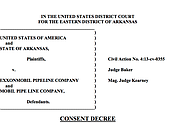Two subsidiaries of Exxon Mobil have agreed to pay almost $5 million in government penalties and to take corrective and precautionary actions as a result of an oil spill in Mayflower in 2013, the Justice Department said.

The penalties and other requirements are part of a proposed consent decree set to be filed in U.S. District Court in Little Rock today, Assistant Attorney General John Cruden of the Justice Department told the Arkansas Democrat-Gazette on Tuesday. The state and federal governments' agreement with Exxon Mobil Pipeline Co. and Mobil Pipe Line Co. is subject to a federal judge's approval after a 30-day comment period takes place.
"This settlement holds ExxonMobil accountable for this very serious oil spill and its disastrous impact on the Mayflower community and environment," Cruden said in a separate statement released by the department.
"We think it's the first oil spill enforcement by the state" of Arkansas, Cruden said by telephone from Washington.
Because nothing had been filed in court as of Tuesday, Exxon Mobil spokesman Christian Flathman said he could say only, "We do not comment on ongoing litigation."
Cruden said, however, that "Exxon Mobil does not admit liability" in agreeing to the measures.
The proposed decree calls for Exxon Mobil to fund an environmental project and take corrective measures to resolve alleged violations of the Clean Water Act and state environmental laws, the Justice Department said in a news release.
Under the proposal, Exxon Mobil would have to treat the roughly 650-mile northern stretch of its Pegasus pipeline -- which includes the part running through Arkansas -- as susceptible to longitudinal seam failure, said Cruden, who is with the department's Environment and Natural Resources Division.
Defects arising from such seam failure led to the Mayflower spill.
Cruden said Exxon Mobil had not been treating the entire northern section that way and added that doing so "will trigger" more stringent regulations from the federal Pipeline and Hazardous Materials Safety Administration.
"That's going to hopefully lead to more proactive" monitoring of the line and other safety measures, he said.
The proposal calls for the subsidiaries to pay $3.19 million in federal civil penalties in addition to addressing pipeline safety issues and oil-response capacity. The companies would pay $1 million in state civil penalties; $600,000 for a project to improve water quality at Lake Conway, a popular fishing spot; and $280,000 to the Arkansas attorney general's office for the state's legal costs, the Justice Department said.
These penalties would be in addition to what Exxon Mobil has already reimbursed federal and state agencies for cleanup efforts and to comply with any Pipeline and Hazardous Materials Safety Administration orders.
Arkansas Attorney General Leslie Rutledge had no immediate comment Tuesday evening. Her office planned to issue a statement later.
Cruden said negotiations on a decree began in December and that the offices of Rutledge and then-Attorney General Dustin McDaniel would have worked on it.
McDaniel said he had not seen the decree and declined to comment Tuesday.
A Texas laboratory hired by Exxon Mobil said in 2013 that the Pegasus pipeline cracked open between two houses in Mayflower's Northwoods neighborhood after manufacturing defects -- specifically, hook cracks in the pipe's seam -- gave way, leaving a 22-foot rupture and spilling heavy crude into the neighborhood, a creek and a cove of Lake Conway. The seam defects are particular to a type of pipe manufactured in the 1940s that is no longer produced.
The northern section of the Pegasus pipeline, built in 1947-48, runs from Patoka, Ill., to Corsicana, Texas, and has remained shut down since shortly after the Mayflower spill. The 211-mile southern section extends from Corsicana to Nederland, Texas, and has been put back into service.
Exxon Mobil has previously estimated that the pipeline spilled 210,000 gallons of Canadian crude. But a Justice Department's statement announcing the consent decree put the estimate at about 134,000 gallons. The amount of spilled oil is a factor in determining the amount of fines under the federal Clean Water Act.
Cruden said that in December or January, Exxon Mobil reached a more accurate accounting of the amount of oil spilled in part by transferring the pipeline's oil still sitting upstream from Conway and thereby seeing how much oil was missing.
In November 2013, the federal Pipeline and Hazardous Materials Safety Administration proposed fining Exxon Mobil $2,659,200, and notified the company of nine "probable" violations of safety regulations. Exxon Mobil has appealed the findings, and no decision had been reached as of Tuesday, safety administration spokesman Damon Hill said.
In June 2013, McDaniel and U.S. Attorney Christopher Thyer announced the federal lawsuit that led to today's agreement.
"In addition to paying significant civil penalties, ExxonMobil will provide money for safety and water-quality projects to help ensure that the residents of the affected area never have to go through an ordeal like this again," Thyer said in the Justice Department release.
"This resolution to a terrible disaster is a testament to the partnership between our federal and state governments to protect the citizens of Arkansas," Thyer added.
Under the consent decree, Exxon Mobil has agreed to provide additional training to its oil-spill first responders, and to establish caches of spill-response equipment and supplies at three sites along the pipeline, including one place near Mayflower, the Justice Department said.
The other sites are set to be at a preserve near Dallas and a reservoir near Corsicana. It was not known Tuesday whether Exxon Mobil has other such sites along the pipeline, which also runs through Missouri and Illinois.
About 13.5 miles of the pipeline runs through the Lake Maumelle watershed, which provides drinking water for more than 400,000 central Arkansans.
John Tynan, a spokesman for Central Arkansas Water -- which oversees that lake -- said Exxon Mobil already has placed oil-response equipment in that area. He said the utility, at its own expense, has placed a mobile-response trailer in the area.
Tynan said the utility also has asked Exxon Mobil to provide additional emergency-response training for utility employees and for local emergency-responders.
The proposed consent decree also provides that Exxon Mobil comply with all federal Pipeline and Hazardous Materials Safety Administration corrective-action requirements before it resumes using the pipeline.
Tynan said he doesn't believe that requirement "is necessarily new," because the safety administration already required such compliance.
Cruden said a court order has "more power, more significance" than a government order.
"If Exxon violates that, we can seek contempt of court," he said, referring to a final consent decree.
Mark Pollins, an official in the U.S. Environmental Protection Agency's office of civil enforcement, said Tuesday that he believes the safety measures, rather than the penalties, are "the major achievement" of the proposed decree because they are aimed at making sure "this does not happen again, that the oil is transported safely and responsibly."
The Clean Water Act makes it illegal to discharge oil or hazardous substances into navigable waters in quantities that could harm the environment or public health.
The federal penalty in this case would go to the Oil Spill Liability Trust Fund managed by the National Pollution Funds Center. Money from that fund goes to pay for federal response activities and to compensate for damage when oil or other hazardous substances are discharged into U.S. waterways or adjoining shorelines, the Justice Department noted.
Other lawsuits resulting from the Mayflower oil spill remain pending, including some in Faulkner County Circuit Court and a federal case that was originally granted class-action status but later dismissed. The plaintiffs in that case have asked the judge to reconsider his order.
A Section on 04/22/2015

